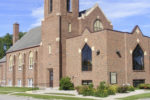 |
Is everything in the Bible true?
“Is everything in the Bible true?”
Is your friend asking that question because his Bible is open to the first chapter? “God saw all that he had made, and it was very good. And there was evening, and there was morning—the sixth day” (Genesis 1:31). Is he wondering whether there really was a six-day creation?
Are you asking that question because your Bible is open to the last chapter? “I am coming soon!” (Revelation 22:7,12,20). Are you wondering whether the return of Christ is genuinely imminent?
Or is the Bible open somewhere in between?
Devilish suspicions
Adam and Eve and the fall into sin. The flood. The promises to Abraham, Isaac, and Jacob. The parting of the Red Sea. God’s law inscribed on stone tablets. The fall of Jericho. A shepherd boy slaying a giant. The widow’s son brought back to life. An iron axhead floating. Are all these events true?
The Son of God healed the deaf, the blind, the paralyzed, and the demon-possessed. He walked on water, stilled a storm, multiplied bread and fish, and called forth his friend Lazarus from the grave. He predicted his own death and resurrection. Then he did it. Really?
All have sinned, and the wages of sin are death and hell. No one does the good required to earn God’s favor. The Father offered up his one and only Son. The gift of God is eternal life in Jesus Christ our Lord. Each of these too is a biblical assertion, but are all of them true?
When the restaurant serves its fare buffet style, you can go to the salad bar first. Or you can bypass the romaine lettuce, baby carrots, and garbanzo beans and head directly to the sliced bacon, fried chicken, and breaded shrimp. You may even make a beeline for the chocolate mousse and the soft-serve ice cream.
Perhaps you have had to take a similar approach with much of what is served up by today’s poets, politicians, and preachers. You bypass some of the fare they offer because more than once you found it distasteful. You skip certain claims they make because you have found them unhealthy. In many settings, the buffet-style approach may be necessary because the devil, as the father of lies, has deceived every human heart and cast suspicion on every human claim.
According to St. John
What a blessing, then, to be served by St. John. Jesus’ apostle starts with the assertion that in the beginning was the Word, and the Word was God. “He was with God in the beginning,” John writes. “The Word became flesh. . . . We have seen his glory, the glory of the one and only Son, who came from the Father, full of grace and truth” (John 1:2,14).
With such bold remarks in his magnificent prologue, John makes clear that what is presented “in the beginning” is no fabrication or fable. Rather, already in the Bible’s majestic opening chapter, the Creator proved the wisdom and power of his Son, the eternal Word.
As the Old Testament prophets did first, the apostles served as the voice of Christ by speaking “from God as they were carried along by the Holy Spirit” (2 Peter 1:21) and proclaiming the eternal truth of the Word.
John skillfully threads the theme of Jesus being the Word into nearly every chapter of his book. For instance, take the account of Jesus and the woman at the well. One day Jesus sits down to rest at a well. He strikes up a conversation with a Samaritan woman. She wants to discuss the water from that deep well. He says that the water he gives will become “a spring of water welling up to eternal life” (John 4:14). Puzzled by that and by Jesus’ wise but disturbing insights into her sinful personal life, the woman tries to turn the topic of conversation elsewhere. She points out how her Samaritan ancestors always worshiped on Mount Gerizim, while Jews insisted that the correct place to worship was Jerusalem. Jesus endorses neither of those options. Instead, he tells her that the “true worshipers” will and must worship “in the Spirit and in truth” (John 4:23,24). And where is this Spirit and truth? In the Messiah. In Jesus. In the Word.
On another day, his hearers pridefully tout the achievements of Moses. Challenging Jesus, they point out that for many years Moses provided bread from heaven. In reply, Jesus says, “It is my Father who gives the true bread from heaven. For the bread of God is the bread that comes down from heaven and gives life to the world. . . . I am the bread of life. Whoever comes to me will never go hungry” (John 6:32,33,35). Who is this true, powerful, and life-giving bread? It is none other than the Christ. Jesus. The Word.
On the night before Jesus’ death, the Lord’s disciples are with him to celebrate the Passover one last time. Jesus gets up from the meal, wraps a towel around his waist, and washes their feet. Then he begins to speak of his departure. “You will follow later” (John 13:36), he tells them. Ever the slave to reason, Thomas asks, “How can we know the way?” Jesus answers, “I am the way and the truth and the life. No one comes to the Father except through me” (John 14:5,6).
From the spirit
His apostles, Jesus says, were to testify to this truth. They would do that with their preaching and teaching. Decades later several would do that with their inspired writings as well. As the Old Testament prophets did first, the apostles served as the voice of Christ by speaking “from God as they were carried along by the Holy Spirit” (2 Peter 1:21) and proclaiming the eternal truth of the Word.
People might wonder how they could do that. With the mind’s limited capacity for accuracy being what it is, how could these human writers fully and accurately remember all the truths of Christ? Sitting at the Passover table that same evening, Jesus gave his apostles several comforting assurances: “I will ask the Father, and he will give you another advocate to help you and be with you forever—the Spirit of truth. . . . He lives with you and will be in you. I will not leave you as orphans; I will come to you” (John 14:16-18). And, “The Spirit of truth who goes out from the Father—he will testify about me” (John 15:26). And again, “When he, the Spirit of truth, comes, he will guide you into all the truth. . . . He will glorify me because it is from me that he will receive what he will make known to you” (John 16:13,14).
Our insisting that everything in the Bible is true, then, is not a foolish overstatement. Our preaching the historical resurrection of our true and only Redeemer is not outdated optimism. It is Jesus. It is the Messiah. It is the Word. It is the testimony of the Holy Spirit not only in sacred writings but also in us and through us. It is also our living Savior’s prayer for all those moments when we struggle with doubt or when others are blown here and there by every wind of teaching: “Sanctify them by the truth; your word is truth” (John 17:17).
Author: Paul Zell
Volume 111, Number 05
Issue: May 2024
- Please explain: Is everything in the Bible true?
- Please explain: Why is the physical resurrection of Jesus Christ from the dead so important?
- Please explain: Why did God give the Ten Commandments?
- Please explain: Why does the Bible call Satan “the god of this age”?
- Please explain: What sets Old Testament Israel apart from other people?
- Please explain: Why is the virgin birth of Christ important?
- Please explain: Am I really a saint?
- Please explain: What does it mean that “many are invited, but few are chosen”?
- Please explain: How is church discipline a loving practice of the church?
- Please explain: Can a Bible verse be overused or used at an inappropriate time or setting?
- Please explain: What can I do when my relationship with Jesus causes family problems?
- Please explain: What good can possibly come from the persecution of Christians?
- Please explain: What is the Holy Spirit’s role in the life of a Christian?
- Please explain: What does it mean that Jesus’ enemies would become a footstool for his feet?
- Please explain: What do people mean when they say that they have been “born again”?
- Please explain: What does it mean that Christians are priests before God?
- Please explain: If I have been baptized, does that mean I have been anointed?
- Please explain: Can Christians be so heavenly minded that they are of no earthly good?
- Please explain: The world is a mess. Why doesn’t Jesus do something about it?
- Please explain: Why is Holy Communion so important to confessional Lutherans?
- Please explain: What does it mean to give up everything to follow Jesus?
- Please explain: If I worry, am I doubting God?
- Please explain: What is the point of praying?
- Please explain: Where do we get the idea of the Trinity when that word isn’t mentioned in the Bible?
- Please explain: If Jesus is the Good Shepherd, how can he also be the Lamb of God?
- Please explain: What’s the big deal about Easter?
- Please explain: Why should we love our enemies?
- Please explain: Why did Jesus do miracles?
- Please explain: As a Christian, what does it mean to be humble?
- Please explain: What does it mean to have your name written in God’s book?
- Please explain: Is God’s design for marriage relevant in today’s world?
- Please explain: Does God favor certain people?
- Please explain: Why do I so often fail to do what God wants?
- Please explain: Why is the church always talking about money?
- Please explain: How does God’s kingdom grow?
- Please explain: Why are only Christians’ works good, but the same works by others are not?
- Please explain: How do we know that Jesus rose from the dead?
- Please explain: If the Sabbath law no longer applies, why do I have to go to church?
- Please explain: Why did God cruelly command Abraham to sacrifice his son?
- Please explain: Does Christian freedom give me the right to do anything?
- Please explain: Is heaven going to be boring?
- Please explain: Why is Jesus taking so long to return?
- Please explain: Why did Jesus use parables to teach?
- Please explain: Does Jesus build his church on Peter and his successors?
- Please explain: How can I be a Christian when there are so many hypocrites in the church?
- Please explain: Why should I be a Christian when I have to suffer?
- Please explain: How do I know whom to believe now that Jesus is gone?
- Please explain: How can Jesus be our friend if he isn’t physically here on earth?
- Please explain: Why can’t my sister have communion with us?
- Please explain: Whom do we blame for bad things?
- Please explain: Are sins of thought as bad as committing the actual sin?
- Please explain: What makes God unique?






